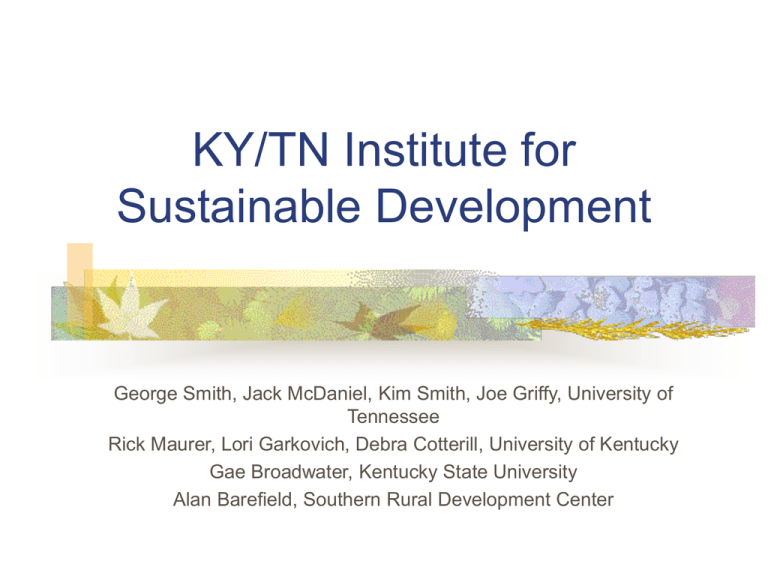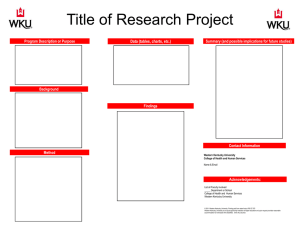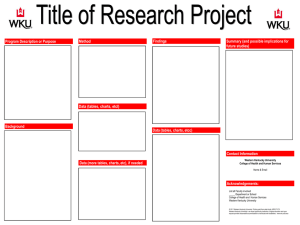Kentucky/Tennessee Institute for Sustainable Development
advertisement

KY/TN Institute for Sustainable Development George Smith, Jack McDaniel, Kim Smith, Joe Griffy, University of Tennessee Rick Maurer, Lori Garkovich, Debra Cotterill, University of Kentucky Gae Broadwater, Kentucky State University Alan Barefield, Southern Rural Development Center Purpose To provide training for county agents in community and economic development – concepts and skills To provide an opportunity for county agents to gain graduate credit by completing an application project during the training time frame To share ideas on what works Structure of the Institute Based on the Southern Regional Community Development Institute materials and organizational structure 3 days of training in April followed by 3 days in October Training outline General community and economic development principles Track on capacity building Track on economic development General Community and Economic Development Principles What is sustainable development? Creating new paradigms in sustainable development Our roles in controversial development projects Rural versus urban development Conflict resolution Natural resource management and economic opportunities General Community and Economic Development Principles Challenges and opportunities of community and economic development programs Engaging new audiences Engaging other parts of the university in community economic development Building partnerships Track 1 – Capacity Building Asset mapping Nurturing leadership Natural resources from a community’s point of view Community infrastructure and services Smart growth Advanced conflict resolution topics Track 2 – Economic Development Business retention and expansion E-commerce Local economic development strategies Economic opportunities of natural resources Entrepreneurial coaching Land use issues Agri-tourism Multi-function agriculture Participants Total of 40 participants in first Institute Agents from Kentucky and Tennessee Agents and administrators from West Virginia Half also enrolled for graduate credit which required completion of an application project and presentation of results Sample Projects “An autumn walk by a stream, a natural resource leadership retreat for women organized by Gwenda Adkins, Elliott County (KY) Extension agent “Elements in the development of a farmer’s market” by Karla Kean, Clarksville, TN Extension agent Application of principles of leadership development and conflict resolution to Agricultural Development Board members training – Robert Amburgey, Jessamine County (KY) Extension agent Brittany Edelstein, Shelby County KY Agent Sample Project Becky Nash, Taylor County KY Agent Sample Project Homeplace on the Green River Participants Comments – The strength of the Institute was: Collective experience of all the participants together Multi-state dynamism It’s a great idea to break state boundaries Collaboration among states Learning about other states and what they do Interaction with people from other states Participants Comments – The strength of the Institute was: Informal networking Opportunity to discuss issues with other agents and to look at what other organizations are doing Sharing of programs and ideas and stories New faces, new ideas Hearing about different programs and how agents use partnership Challenges to Multistate Cooperation Travel Coordinating workable dates Variations in community economic development responsibilities among agents Variations in community settings and state policies, programs, and regulations Opportunities from Multistate Cooperation Diversity of innovative ideas Recognizing that despite differences in state conditions, there are fundamental common challenges to community economic development Spread the SRDC CDI materials to agents who would not likely travel to a regional training – cost effective Opportunities from multistate cooperation Builds on the community economic development assets of participating states Captures the value of specialists’ expertise Some participants drew on the expertise of others in developing and implementing programs – within and cross-state sharing Produced a CD-Rom of training materials and presentations so information can be shared Broader Issues How to implement continuous training in community economic development for agents when Most agents do not have professional backgrounds in community economic development Most agents do not have community economic development in their title or as an explicit program responsibility Great discoveries and improvements invariably involve the cooperation of many minds Alexander Graham Bell



